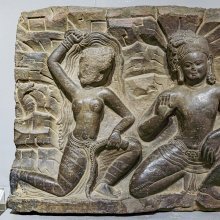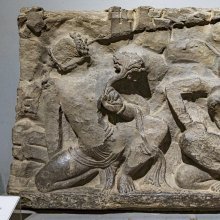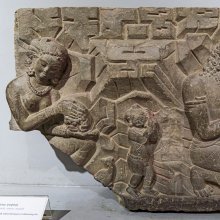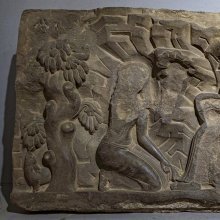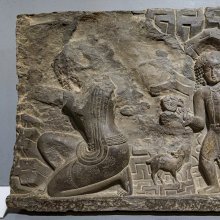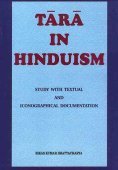Kumarasambhava, Kumara-sambhava, Kumārasaṃbhava: 10 definitions
Introduction:
Kumarasambhava means something in Hinduism, Sanskrit. If you want to know the exact meaning, history, etymology or English translation of this term then check out the descriptions on this page. Add your comment or reference to a book if you want to contribute to this summary article.
Images (photo gallery)
In Hinduism
Kavya (poetry)
Source: Google Books: KumārasambhavaThe Kumarasambhava of Kalidasa varies from the loveliness of spring and the delights of married love to the utter desolation induced by the death of beloved. The subject is unquestionably a daring one: the events which bring about the marriage of Lord Siva to Uma and the birth of Skanda. The prose order of each sloka has been given in the commentary by using bold type, the words not actually repeated by Mallinatha being enclosed within rectangular brackets. The notes explain allusions, grammatical peculiarities not noticed by Mallinatha, copious extracts from other commentaries being given for this purpose. The book includes text, the commentary of Mallinatha, a literal English translation, notes and introduction.

Kavya (काव्य, kavya) refers to Sanskrit poetry, a popular ancient Indian tradition of literature. There have been many Sanskrit poets over the ages, hailing from ancient India and beyond. This topic includes mahakavya, or ‘epic poetry’ and natya, or ‘dramatic poetry’.
Purana and Itihasa (epic history)
Source: Cologne Digital Sanskrit Dictionaries: The Purana IndexKumārasaṃbhava (कुमारसंभव).—See tārakāmaya.

The Purana (पुराण, purāṇas) refers to Sanskrit literature preserving ancient India’s vast cultural history, including historical legends, religious ceremonies, various arts and sciences. The eighteen mahapuranas total over 400,000 shlokas (metrical couplets) and date to at least several centuries BCE.
General definition (in Hinduism)
Source: WikiPedia: HinduismKumārasambhava (कुमारसम्भव) is a Sanskrit epic poem by Kālidāsa. The Kumārasambhava is widely regarded as one of Kālidāsa's finest works, a paradigmatic example of Kāvya poetry. The style of description of spring set the standard for nature metaphors pervading many centuries of Indian literary tradition.
Source: FreeIndia: HinduismOne of Kalidasa's greatest works is 'Kumarasambhava'. Critics maintain that Kalidasa wrote only the first eight chapters of the epic poem. The work describes the marriage of Lord Shiva and his consort Parvati. It begins with a fine description of that giant among mountains, the Himalaya.
Languages of India and abroad
Sanskrit dictionary
Source: DDSA: The practical Sanskrit-English dictionaryKumārasaṃbhava (कुमारसंभव).—Name of Kalidāsa's epic.
Derivable forms: kumārasaṃbhavam (कुमारसंभवम्).
Kumārasaṃbhava is a Sanskrit compound consisting of the terms kumāra and saṃbhava (संभव).
Source: Cologne Digital Sanskrit Dictionaries: Cappeller Sanskrit-English DictionaryKumārasaṃbhava (कुमारसंभव).—[masculine] the birth of the god of war, T. of a poem.
Source: Cologne Digital Sanskrit Dictionaries: Aufrecht Catalogus Catalogorum1) Kumārasaṃbhava (कुमारसंभव) as mentioned in Aufrecht’s Catalogus Catalogorum:—kāvya, by Kālidāsa. Jones. 408. Io. 179. 228. 304. 2025 ([fragmentary]). W. p. 150. Oxf. 115^a. Paris. (B 87. B 227 Ii. D 83). Kh. 84. K. 58. B. 2, 76. Ben. 35. 36. Bik. 237. Tu7b. 8. 9. Kāṭm. 6 (and—[commentary]). Pheh. 5 (and—[commentary]). Rādh. 21 (and—[commentary]). NW. 622. Burnell. 156^a. Bhr. 138. 139 (and—[commentary]). Poona. 220. Ii, 178. Vienna. 17. H. 54-56. Taylor. 1, 63. 64. 170-73. 299. 437. Oppert. 544. 638. 771. 883. 1798. 2506. 2585. 3773. 3965. 4136. 4398. 5014. 6565. 6888. 7095. 7285. 7539. 7750. Ii, 921. 2382. 2563. 2786. 6652. 9022. Rice. 228. W. 1537. 1540-42. Peters. 2, 188 (and—[commentary]). Bp. 301.
—[commentary] Jac. 696.
—[commentary] Padārthadīpikā. Oppert. 5940.
—[commentary] Anvayalāpikā by Kṛṣṇapati Śarman. Quotes the commentaries by Jagaddhara and Divākara L. 2403.
—[commentary] by Kṛṣṇamitrācārya. Oudh. X, 6.
—[commentary] Sārāvalī by Gopālananda. L. 2476. Io. 222 (Nandagopāla).
—[commentary] Dhīrarañjanikā by Govindarāma. L. 751.
—[commentary] Śiśuhitaiṣiṇī by Cāritravardhana. Kh. 65.
—[commentary] Bālabodhinī by Jinabhadra Sūri. Lahore. 4.
—[commentary] by Narahari. Burnell. 156^a.
—[commentary] by Nārāyaṇa. Oppert. 2586.
—[commentary] by Prabhākara. B. 2, 76.
—[commentary] by Bṛhaspati. Io. 1073.
—[commentary] Subodhā by Bharatasena. Io. 228. L. 397.
—[commentary] by Bhīṣmamiśra Maithila. Oudh. Xix, 42.
—[commentary] Avacūri by Muni Matiratna. Peters. 2, 54.
—[commentary] Saṃjīvinī by Mallinātha. Io. 179. 575. 1923. W. p. 150. Oxf. 115^a. B. 2, 76. Rādh. 21. Burnell. 156^a. Gu. 4. Poona. 220. Taylor. 1, 299. 436. 437. 484. Oppert. 2800. 7907. Ii, 8185. Rice. 228. Bp. 301. Sb. 304.
—[commentary] Vyākhyāsudhā by Raghupati (explains the 8th book also). L. 1964.
—[commentary] by Vatsa. B. 2, 78.
—[commentary] by Ānandadevāyani Vallabha. Oudh. Xiv, 28. W. 1541.
—[commentary] by Vallabhadeva. B. 2, 78. NW. 614. H. 56. Peters. 1, 114. Bp. 262.
—[commentary] Kathambhūtikā by Vindhyeśvarīprasāda. NW. 620.
—[commentary] Śiśuhitaiṣiṇī by Vyāsavatsa. Bp. 17.
—[commentary] Devasenā by Haricaraṇadāsa. Peters. 1, 114.
2) Kumārasaṃbhava (कुमारसंभव):—add Bp. 262. read Io. 2525 ([fragmentary]) instead of 2025, and Paris. (B 228) instead of 227.
—[commentary] by Gopālananda. read Io. 228.
—[commentary] by Mallinātha. add Ben. 36 and NW. 622.
3) Kumārasaṃbhava (कुमारसंभव):—by Kālidāsa. Io. 179 (omits 3. 4). 228. 808. 1601. 2469. 2525. Fl. 63. 64 (and—[commentary]). Gb. 53. 54. Peters. 4, 25. Rgb. 334-36. Stein 67 (inc.).
—[commentary] Avacūri. Rgb. 338.
—[commentary] by Gopāladāsa. Peters. 4, 25.
—[commentary] Sārāvalī by Nandagopāla. Io. 228 (not 222). 849.
—[commentary] by Jinasamudra Sūri. Rgb. 337.
—[commentary] by Narahari (Sarasvatītīrtha). Stein 67 (1-5).
—[commentary] by Nārāyaṇa. Gov. Or. Libr. Madras 19.
—[commentary] by Bṛhaspati. Io. 228. 1073.
—[commentary] Saṃjīvanī by Mallinātha. Io. 228. 2111. 2114.
—[commentary] by Vijayagaṇi. Rgb. 336.
—[commentary] Śiśuhitaiṣiṇī by Vyāsavatsa. Rgb. 334 (Vatsavyāsa).
—[commentary] Saṃjīvanī on sarga 8-17, by Sītārāma. L. 3289. Kumārasambhavasthūlārthanirṇaya. Io. 163. 898.
4) Kumārasaṃbhava (कुमारसंभव):—by Kālidāsa. Ulwar 902 (1-7). 903 (11 sargāḥ).
—[commentary] Saṃjīvanī by Mallinātha. Ulwar 904.
5) Kumārasaṃbhava (कुमारसंभव):—by Kālidāsa. Ak 473 (1-8). 474 (8-17). 475 (1-7 and C.). 476 (1-3). As p. 47. Bd. 378. 379. Il. L.. 365-372. Peters. 5, 332. 6, 330. C. [anonymous] L.. 374 (1-4). C. Khaṇḍānvayī. Peters. 6, 330. C. by Gopālānanda. As p. 47. C. by Navanītarāmamiśra. As p. 47. C. by Nārayaṇa, a pupil of Kṛṣṇa. Whish 118 (1-8). C. by Bharatasena. As p. 47. Io. 228. 1206. C. by Mallinātha. L.. 373. Śg. 2, 95. C. by Vatsavyāsa. Bd. 378. C. by Vallabha. Peters. 5, 333 (1-8). C. by Vallabhadeva. Bd. 379. L.. 372. C. by Haridāsa Miśra. Ak 476 (1-3).
Source: Cologne Digital Sanskrit Dictionaries: Monier-Williams Sanskrit-English Dictionary1) Kumārasambhava (कुमारसम्भव):—[=kumāra-sambhava] [from kumāra] m. the birth of Skanda or Kārttikeya, [Rāmāyaṇa i, 38, 31]
2) [v.s. ...] Name of a poem by Kālidāsa.
[Sanskrit to German]
Sanskrit, also spelled संस्कृतम् (saṃskṛtam), is an ancient language of India commonly seen as the grandmother of the Indo-European language family (even English!). Closely allied with Prakrit and Pali, Sanskrit is more exhaustive in both grammar and terms and has the most extensive collection of literature in the world, greatly surpassing its sister-languages Greek and Latin.
See also (Relevant definitions)
Partial matches: Kumara, Shambhava.
Starts with: Kumarasambhavacampu.
Full-text (+2878): Sarvatogamin, Dantavasas, Upadeshata, Purashasana, Uccaihshiras, Eshaniya, Sthalaravinda, Kalanjana, Surayudha, Paryakulatva, Paretabhumi, Paryakship, Ambarkas, Vitantri, Kanashas, Shlathalambin, Karkashatva, Alokaniyata, Oshadhiprastha, Yathavriddham.
Relevant text
Search found 52 books and stories containing Kumarasambhava, Kumara-sambhava, Kumārasaṃbhava, Kumāra-saṃbhava, Kumārasambhava, Kumāra-sambhava; (plurals include: Kumarasambhavas, sambhavas, Kumārasaṃbhavas, saṃbhavas, Kumārasambhavas). You can also click to the full overview containing English textual excerpts. Below are direct links for the most relevant articles:
The Markandeya Purana (Study) (by Chandamita Bhattacharya)
Use of Cosmetics, Perfumes, Incense, etc. < [Chapter 2]
Wine (alcoholic drinks) < [Chapter 2]
Kavyamimamsa of Rajasekhara (Study) (by Debabrata Barai)
Part 7.1 - Origin and development of the Kavisamaya (poetic conventions) < [Chapter 5 - Analyasis and Interpretations of the Kāvyamīmāṃsā]
Part 7.8 - Poetic conventions regarding to the Gold, Jewels and Pearls < [Chapter 5 - Analyasis and Interpretations of the Kāvyamīmāṃsā]
Part 7.7 - Poetic conventions regarding to the Birds < [Chapter 5 - Analyasis and Interpretations of the Kāvyamīmāṃsā]
Amarakoshodghatana of Kshirasvamin (study) (by A. Yamuna Devi)
Amarakośodghāṭana (Introduction) < [Chapter 2 - Kṣīrasvāmin: Life and Works]
Belief in the presence of evil spirits < [Chapter 4 - Cultural Aspects]
The Himalayas < [April – June, 1982]
Kalidasa, the Poet < [July-August 1931]
Kalidasa the Man < [March 1939]
Atithi or Guest Reception (study) (by Sarika. P.)
Part 2 - References to Hospitality in the Kumārasaṃbhava < [Chapter 4 - Atithi-saparyā in Classical Sanskrit Literature]
Part 13 - References to Hospitality in Subhāṣita-Ratna-Bhāṇḍāgāra < [Chapter 4 - Atithi-saparyā in Classical Sanskrit Literature]
Part 2 - Treatment of Atithi (guest-reception) in Mahābhārata < [Chapter 3 - Atithi-saparyā in Epics and Purāṇas]
Sahitya-kaumudi by Baladeva Vidyabhushana (by Gaurapada Dāsa)
Text 11.37 < [Chapter 11 - Additional Ornaments]
Text 7.144 < [Chapter 7 - Literary Faults]
Text 11.40 [Parikarāṅkura] < [Chapter 11 - Additional Ornaments]
Related products
